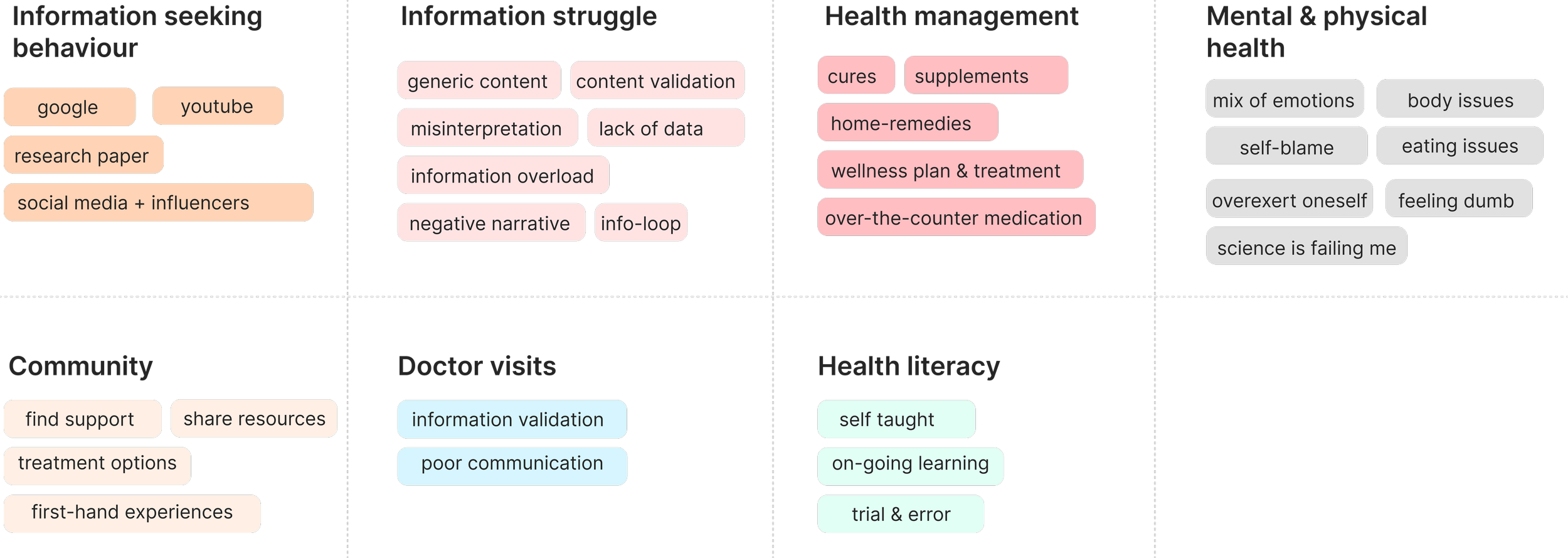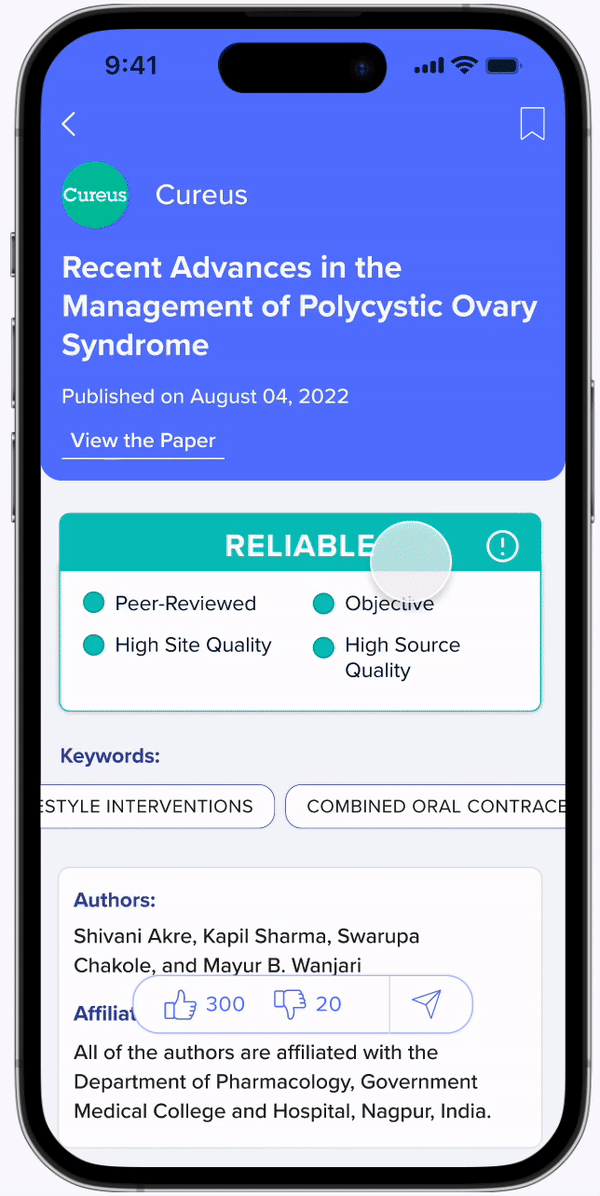
Empowering women’s endocrine health literacy online
Well Informed
THE CHALLENGE
Despite information being just one click away, women searching for endocrine-health guidance find the web awash in gender-biased myths. Endocrine disorders affect 6–12% of women worldwide, with 91% of women fearing health misinformation (Plan International), while 75%–85% of women are more likely to utilize digital tools for their healthcare needs (Frost and Sullivan). Yet, they face significant barriers in accessing reliable information on endocrine health online. These barriers also add to social and cultural norms, financial constraints, and limited healthcare access. Unmoderated forums, influencer posts, and ad-driven blogs force women into exhausting, invisible fact-checking and often self-blame when the “facts” fail them. Understanding how search tools amplify health misinformation and create an impact was the first step toward solutions that (1) give women back the power to assess claims about their bodies and (2) lift the exhausting burden of constant fact-checking.
How might we reduce the impact of health misinformation consumed by women looking to manage the many symptoms caused by endocrine conditions?
DISCOVERY & RESEARCH
To understand a complex topic, I focused my thesis on four key themes: how women seek and trust health information online, their experiences with misinformation, and how they ultimately use what they find. Survey results revealed that 66% of participants encountered inaccurate information about women's health, with 36% reporting being impacted by misinformation.
Number of participants who have come across health misinformation (110 responses)
Number of participants impacted by health misinformation (110 responses)
In-depth interviews with 12 participants unveiled three primary sources for their information search: blogs, social media, and research papers. However, participants expressed challenges in validating the accuracy of online information, particularly for vulnerable issues.
10/12 participants were negatively impacted by health misinformation.
Despite efforts to verify information, many struggled with conflicting online sources and lacked tools to differentiate between accurate and inaccurate information. Consequently, some relied on community forums as their sole reliable source. Limited financial resources also hindered access to healthcare professionals, exacerbating the reliance on online sources.
The research uncovered significant findings regarding the prevalence of misinformation and negative narratives surrounding women's health online, along with negative experiences with healthcare providers. Participants emphasized the profound impact of misinformation on mental health and healthcare-seeking behaviors. The study also identified behaviors and factors associated with successful health literacy practices among health professionals and women with easy access to healthcare services, aiding them in navigating misinformation effectively. Once validated, the findings were systematically codified into themes and patterns to inform the development of design interventions and testing methodologies. The imperative lies in integrating health experts into online communities, enabling them to verify health information shared by community members and facilitate education and management of their conditions.
"Health literacy, defined as the skills needed to make health decisions in everyday life, and eHealth literacy, encompassing the ability to seek, find, understand, and appraise health information from electronic sources, played pivotal roles in navigating health information online.” (Front Public Health)
POWER OF
COMMUNITY
During my research, I spoke with a participant from France who shared an inspiring story of resilience and empowerment. Struggling with an endocrine condition, she embarked on a relentless search for reliable information to understand and manage her symptoms. After months of navigating various online communities, she stumbled upon a unique Facebook group curated by women doctors. What set this group apart was its commitment to validating the reliability of endocrine articles shared within the community. This initiative gave her and fellow members a much-needed sense of security and confidence in the information they received. For her, this group became a lifeline. This invaluable resource not only deepened her understanding of her condition but also empowered her to advocate for herself and manage her symptoms more effectively.
Key findings
The key findings of the research show that women seeking information related to endocrine conditions face significant challenges in accessing credible and trustworthy sources of information. Many women reported relying on Google searches and community forums for information, but also expressed concerns about misinformation and negative narratives regarding women’s health online. Several participants also had negative experiences with doctors obtaining accurate information about their conditions and management. The impact of misinformation on mental health was also a common theme among participants. The research highlights the need for improved access to credible information and resources for women navigating endocrine conditions.
DESIGN AS SOLUTION
In designing interventions, my primary focus was creating a tool tailored to the needs of the endocrine health community: a reliability checker app. With the
concept app 'Well Informed,' my goal was to bridge the gap between reliable information and individuals managing endocrine conditions. Co-designed with healthcare professionals and participants, the app evaluates the credibility of health articles or papers based on criteria such as peer review, site quality, source quality, author expertise, claims of cure, and article tone. For the sake of the minimum viable product (MVP), I concentrated solely on assessing online information related to PCOS and testing it with women impacted by PCOS misinformation.
TESTING THE SOLUTION
After months of research and design, I tested the MVP prototype with 8 participants to assess the potential impact of an app like Well Informed on health literacy and information awareness. The results indicated a significant improvement, with participants increasing their health literacy and awareness by an average of 20% after being exposed to various analyzed articles and blogs compared to their first use of the app.
One participant commented, 'After the study, I've learned to consider many factors when determining the credibility of an article. I first check the author's educational background and qualifications to ensure they have sufficient academic expertise and subject knowledge.’
Another participant remarked, ''It helped me understand better how to distinguish legitimate information from opinions.’
These testimonials underscore the app's effectiveness in enhancing users' abilities to evaluate health information and discern credible sources from opinions critically. By providing tools to access reliable information on endocrine health, particularly PCOS, we can empower women to build health literacy, make informed decisions about their well-being, and mitigate the spread of health misinformation. Such initiatives can increase awareness and understanding of endocrine health issues on a broader scale.
Overall, a concept app like Well Informed holds the potential to positively impact women's health by advocating for reliable health information while also raising crucial ethical considerations. These considerations encompass the accuracy and privacy of health information and the social impact of advocating for trustworthy information to promote informed living and facilitate better communication with health experts.









